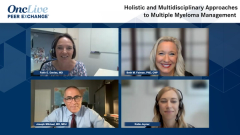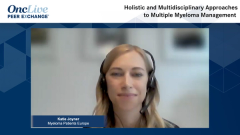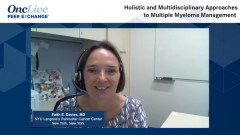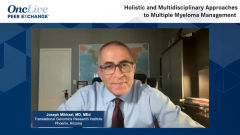
Multiple Myeloma: Regulatory Aspects of Treatment Development and Approval
A focused discussion on the regulatory aspects of drug testing and approval, globally, with respect to the setting of multiple myeloma management.
Episodes in this series

Transcript:
Faith E. Davies, MD: And I guess just in closing this little bit, Joe, any … comments about the regulatory aspects of these new treatments and pathways in the US? And then maybe we’ll go to Katie for a European [perspective], and obviously we shouldn’t forget our Canadian, Australian, and South American colleagues. So … any comments about that … area, regulation and so on?
Joseph Mikhael, MD, MEd: Absolutely. And being a transplant, as you were, in one way from Canada now to the US, I’m very familiar with the Canadian system, as well. We’re seeing a little bit of an evolution here in the US where there is a sensitivity that historically, there could be a very long lag between very positive evidence around an agent and its accessibility to the clinic. And so, the accelerated programs have ... really here in the US facilitated a more rapid approval, if you will. Of course, everything has 2 sides to it. And it also means that things can be pulled a bit more quickly when there isn’t a confirmatory phase III trial, as we’ve seen to agents here in the US recently approved on the accelerated pathway and then withdrawn from the market.
There’s a greater feeling and sense that we have to have a streamlined process to do this, No. 1. No. 2, the connection between approval and reimbursement needs to be there. And we’re relatively blessed here … [in] the US that the NCCN [National Comprehensive Cancer Network] guidelines, that very often [are] what guide reimbursement, tend to be rather quickly responding to any approval, whereas this is a really big challenge in many other countries, in Latin America, in particular, [and] in Canada. And I know Katie can speak to it in Europe. There is truly an approved agent, one agency says, look, the science and the evidence demonstrate this agent is useful, and yet the reimbursement, whether through a public system or whatever method reimbursement occurs, has a tremendous lag behind.
And so ... that is a particular unmet need in a challenging area. And some of that is just pragmatic from budgetary purposes, and some of it is because different evaluative processes are needed for financial reimbursement as opposed to theoretical scientific acknowledgment. So, that is something that ... will have to be addressed more fully with time that … it’s not just that you prove that a drug is safe and they prove that a drug is effective, but really that it’s also cost effective. And so, the cost feature comes into much of this. And that’s not been as heavily influenced in the US as in other countries. And it has often led to a significant delay in access to those therapies.
Faith E. Davies, MD: I agree. And ... one of the other areas, as well, is that hopefully having some forms of pathways, which are flexible … to help guide people as to where in the treatment pathway patients should be or physicians should be thinking about these drugs. Katie, anything you want to add?
Katie Joyner: So, obviously, there [are] huge inequalities across Europe because of the reimbursement system. So, while we have a centralized … approval process for the medicines, each country then decides whether or not it will be reimbursed. And so, that’s up to the HTA [health technology assessment] bodies there to evaluate the data and then the budgetary decisions. And so, you have a lot of new therapies … coming down the pipeline, getting approved. They’re very expensive. So … some countries simply can’t afford it or the HTA bodies decide that the data [are] not there to make that decision because we have … maybe the safety and efficacy data, of course, but not the data we need to show the real value for patients. So, you end up with countries where, again, they have … Western European countries with access to most of the medicines and Central and Eastern European countries with very limited access.
But even now with the bispecifics and the CAR Ts, which are so expensive—and again, [there’s] not enough of the patient evidence data to really demonstrate some of the value—you have countries like France and the UK where typically, access is available, not having approvals for those medications. So … with again, all of the new therapies coming, [they’re] great for options, but if they can’t reach the patient, it doesn’t really do anyone any good. So, we really need to understand what data [are] needed to help demonstrate value for the payers and … reduce that lag time. I would argue in certain countries, it’s not really a lag, it just will be impossible. There are countries in Europe that will maybe never see some of these novel therapies, which is … not fair for patients there.
Faith E. Davies, MD: No, no, thank you, Katie.
Transcript is AI-generated and edited for clarity and readability.









































